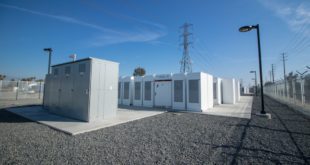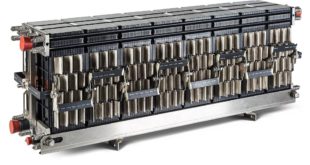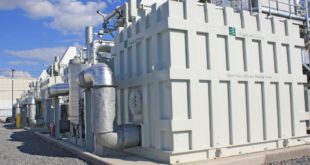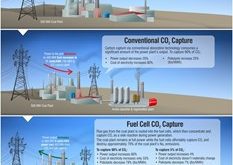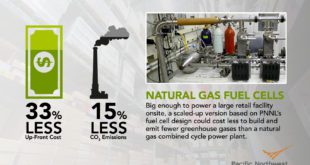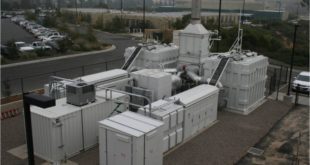World’s Largest Fuel Cell Park Completed in South Korea

FuelCell Energy, Inc. (Nasdaq:FCEL), a global leader in the design, manufacture, operation and service of ultra-clean, efficient and reliable fuel cell power plants, today announced a series of updates about the Asian market including completion of the world’s largest fuel cell park in South Korea, the sale of 3.7 megawatts of fuel cell modules to POSCO Energy in the first quarter of 2014 to meet increasing demand, and a 19.6 megawatt fuel cell park to be constructed in Seoul City, South Korea.
The Gyeonggi Green Energy fuel cell park, located in Hwasung City, South Korea, is fully operational. The largest fuel cell park in the world, the facility consists of 21 FuelCell Energy DFC3000(R) power plants, rated at 2.8 megawatts each, requiring only about 5.1 acres of land for 59 megawatts of new and renewable power. The fuel cell park provides continuous baseload electricity to the South Korean electric grid and usable high quality heat for a district heating system. POSCO Energy commenced construction on this project in November 2012 and finished in only 13 months, illustrating the ability to rapidly construct multi-megawatt fuel cell installations that enhance grid resiliency.
“The scale of this installation is contributing to the power and heating needs of an urban population and generating the electricity in a highly efficient and ultra-low emission profile that supports our National renewable portfolio standard,” said Tae-Ho Lee, Chief Executive Officer at Gyeonggi Green Energy.
In order to meet the accelerating market demand in Asia, FuelCell
Energy sold two 1.4 megawatt and three 300 kilowatt fuel cell modules
to POSCO Energy during the first quarter of 2014. These modules are in
addition to the monthly fuel cell kit shipments under an existing 122
megawatt order that was signed in October 2012.
“These module purchases are providing us the ability to meet additional
demand above and beyond our existing fuel cell kit orders,” said
Jung-Gon Kim, Senior Vice President of POSCO Energy. “We are pursuing
combined heat and power opportunities with building applications as
well as a demonstration project at a liquefied natural gas terminal to
efficiently convert boil-off natural gas to ultra-clean power.”
Seoul City, South Korea continues to adopt new and renewable power
generation to reduce dependence on nuclear power including the recent
groundbreaking for the 19.6 megawatt Godeok Rolling Stock Management
Office fuel cell park, consisting of seven DFC3000(R) fuel cell power
plants that each provide 2.8 megawatts of power. The fuel cell park is
adjacent to a railroad depot operated by the Seoul Metropolitan Rapid
Transit Corporation. The ultra-clean electricity will be supplied to
the electric grid and the usable high quality heat supplied to a
district heating system. In the event of an electrical grid disruption
or outage, the electricity from the fuel cell park will provide power
to the railroad depot. The power output is adequate to power
approximately 45,000 South Korean households. The fuel cell power
plants will be supplied by POSCO Energy using licensed technology and
fuel cell components manufactured by FuelCell Energy. The fuel cell
park is expected to be operational by the end of 2014.
“Both of these fuel cell parks illustrate how our distributed power
generation solutions enhance the resiliency of the electric grid with
baseload power delivered in an environmentally friendly manner,” said
Chip Bottone, President and Chief Executive Officer, FuelCell Energy,
Inc.
Direct FuelCell(R) (DFC(R)) power plants solve energy, environmental
and business-related power generation challenges by providing ultra
clean, efficient and reliable distributed power generation. The fuel
cells combine a fuel such as natural gas or renewable biogas with
oxygen from the ambient air to efficiently produce ultra-clean
electricity and usable high quality heat through an electrochemical
process. Virtually no pollutants are emitted due to the absence of
combustion. Avoiding the emission of nitrogen oxide (NOx), sulfur
dioxide (SOx) and particulate matter (PM10) supports clean air
regulations and benefits public health. The high efficiency of the fuel
cell power generation process reduces fuel costs and carbon emissions,
and producing both electricity and heat from the same unit of fuel
further supports favorable economics while also promoting
sustainability.
 Alternative Energy HQ solar power for homes, wind energy, and bio fuel issues
Alternative Energy HQ solar power for homes, wind energy, and bio fuel issues

